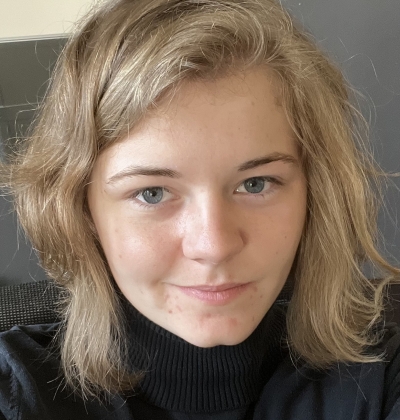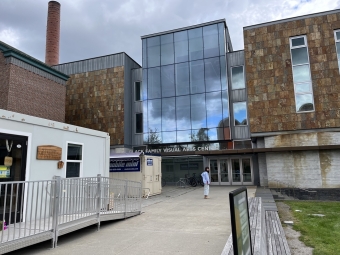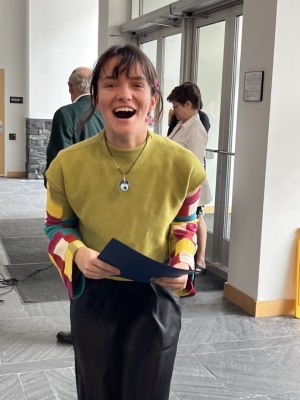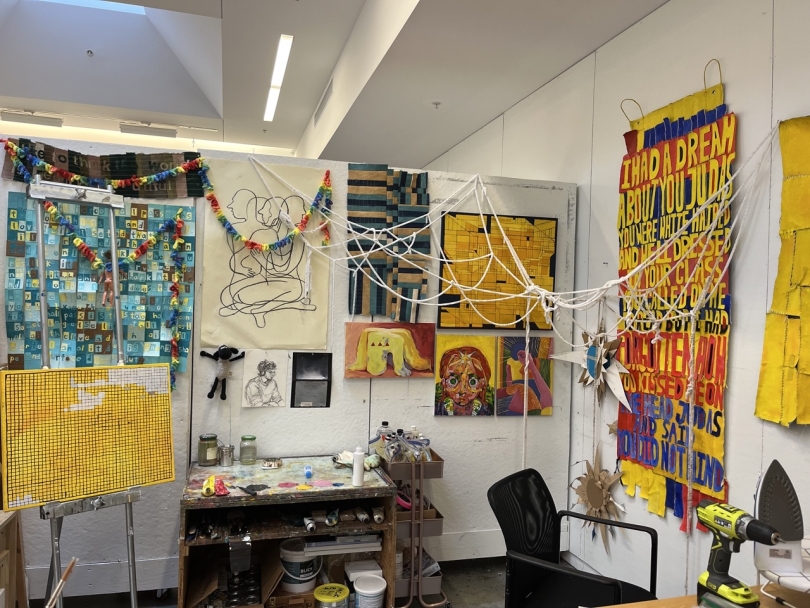
An Interview with a Studio Art Major
Today I'm sitting down for a chat with artist and recent Dartmouth alumna McKenna '23. We met in freshman year and became close friends after COVID. Not only did we live in the same dorm cluster as freshmen (we're both in School House), we are also currently roommates in Hanover! McKenna's originally from Phoenix, Arizona, and in classic Dartmouth fashion considered majoring in everything from Cognitive Science to Math, but eventually settled on Studio Art. She's an incredibly intelligent and talented person, and if you're interested in Studio Art at Dartmouth, I can think of no better introduction to the department than her.
Q: Why did you decide to major in Studio Art?
A: I don't think it's worth it to major in something you're not interested in here, because everyone is so good at what they do. Being smart and capable isn't enough—you also have to genuinely care about your area. I tried other majors—but with those, I was going to class because it was what I was supposed to do, and meanwhile I was surrounded by people who really cared about the subject matter. The only classes where I always felt that level of passion and interest were Studio Art classes, so it made sense as my major.

Q: What is the Studio Artdepartment like?
A: The department is small so you get a lot of personal attention. There are a lot of resources: funding and facilities alike. We have two woodshops and a welding and metal-working shop. We also have a print shop with screen printing, relief carving, etching presses, and a Vandercook printing press. That's not to mention our huge drawing and painting rooms. We have equipment that even dedicated art schools don't have. We get to do so much that you need specific equipment for and therefore wouldn't have the chance to do elsewhere.
Professors and students are in the Visual Arts Center almost every day, so you can always find someone to direct your questions toward. Each studio art class is small and full of talented people, and the professors are incredibly qualified and accoladed. We get a lot of great mentorship that goes beyond simple instruction. We have famous artists here who are here to teach us. Not only that, they're friendly, and you can always find someone with the same interests and goals as you.
One downside: a ten week term is not long enough for a studio art class, in my opinion. Senior seminar is helpful in this regard because you're doing two terms worth of individual work with ongoing guidance and "crits" [critical reviews of ongoing work].
Q: Do you have a favorite major class you've taken at Dartmouth?
A: Advanced Printmaking—although it's hard to pick because I loved my sculpture and painting classes. But in printmaking I learned so much that I couldn't learn at home or elsewhere, since you need specific materials and equipment for different printmaking techniques. You can't normally take up copper etching on your own, for example, so it was a great opportunity to learn new techniques.

Q: What are you doing right now, and what do you plan on doing in the future?
A: The department has an internship program where they hire about five graduating studio art majors as staff for a year. Studio art interns help in classes, monitor undergraduates in the studio, and get paid individual studio time. I graduated in spring of 2023 and was hired as a studio art intern immediately after. I've gotten to further develop relationships with professors and prepare my professional portfolio. I'm also preparing to apply to graduate school and get my MFA. One goal of the internship program is to prepare recent graduates to be professional artists, so I've gotten a lot of career advice and have continued to develop my portfolio.
Q: What does it look like for you to take a project from conception to completion?
A: A lot of lower level classes have weekly or bi-weekly assignments, but once you get to higher-level classes or even the honors project, which is two terms long, you're doing your own long-term work with a budget, with regular crits, and with professorial guidance. Advanced Printmaking was one of the first concept-driven courses I took. We spent the first three weeks going over concepts or techniques, but then the next seven weeks were dedicated to one final project. In class we were going over history, theory, and we were doing crits as well. So much of Studio Art is having this extravagant idea and then producing horrible models—making stuff over and over, trial and error—until you can finally get your idea into reality. Eventually you're able to make something successful, and during that creation process you have to think seriously about why you do what you're doing, why you make each choice, and why other people should care about your art.
Thanks, McKenna! And thank you too, readers. If you want to learn more about the Studio Art department, their website is here. Until next post!



















